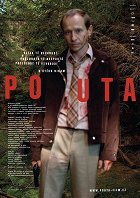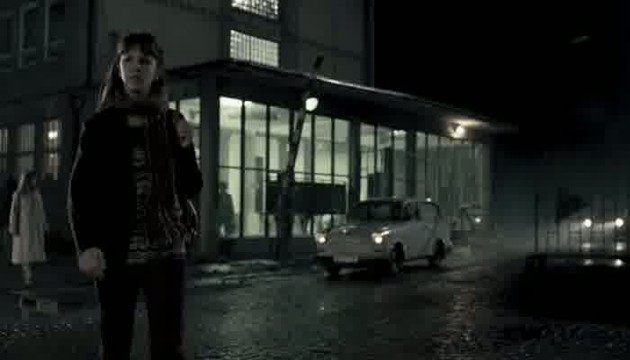Regie:
Radim ŠpačekDrehbuch:
Ondřej ŠtindlKamera:
Jaromír KačerMusik:
Tomáš VtípilBesetzung:
Ondřej Malý, Kristína Tormová, Martin Finger, Luboš Veselý, Lukáš Latinák, Barbora Milotová, Oldřich Kaiser, Ivana Uhlířová, Iva Pazderková (mehr)Streaming (1)
Inhalte(1)
Czechoslovakia, 1982. The totalitarian regime seems to be endless and impossible to end. Antonín, a member of the secret police, is restless in the inside, maybe even a psychopathic violent man full of unarticulated rage and despair. Bored with everything around him, he directs his demons to a seemingly clear but rather an unseizable point – to a young woman called Klára. It is not love or any other kind of pure passion – just a burning desire for an illusion of escape from the grey cage and boredom. Antonín´s absurd effort to get Klára for himself not only turns him against traditional enemies of the regime but also against his own people and the system itself. But if Antonín breaks the rules of the organization in the service of which he is, it is not a civil or political gesture – it is a clearly personal and frantic revolt. (Verleiher-Text)
(mehr)Kritiken (10)
Eine zweieinhalb Stunden dauernde psychologische Partie über Figuren, die durch ein politisches System waten, das keine Sieger hatte und welches der Krebs der menschlichen Seele war. Nur eine Erinnerung an diese Zeit tut schon weh. Ein ausgezeichnetes Drehbuch mit einer detaillierten Darstellung der Charaktere und ihrer funkelnden Kollisionen; maximal konzentrierte Schauspielleistungen; eine exakte, langsam aber sicher ins Schwarze zielende Regie. Achten Sie nicht auf die gewisse anfängliche Langwierigkeit, die Abwesenheit von bekannten Gesichtern und den visuellen Minimalismus, der den Anschein einer TV-Produktion weckt. Alles, einschließlich der kalt aufgenommenen Plattenbausiedlungen oder der eintönigen Musik, welche die psychologisch gespannten Momente intensiviert, hat hier seinen Platz. Aber Achtung, es ist kein angenehmer Film. Es ist ein sehr trauriger Film, dem die heutige Teen-Generation, die nicht die Vergangenheit in der Tschechoslowakei erlebte, möglicherweise gar nicht glauben wird…
()
Through Štindl's magnificent script, precise and detailed production design (it brought back memories of the ticket punching machines in trams, etc.) and an inventive soundtrack, Špaček tells an interesting, weighty and well-crafted psychological portrait of a brooding bastard who plays at being a demigod from his position as member of the secret police. I consider the final meeting in the dissident's flat to be the best executed and acted scene in a Czech film last year. Ondřej Malý can already prepare a shelf for the Czech Lion.
()
After a long time (since Ševčík’s Normal the Düsseldorf Ripper), I didn’t have trouble forgetting I was watching a Czech film while watching a Czech film and didn’t have to be lenient in my rating. Ondřej Malý is brilliant in the role of that secret police asshole, you can feel the character boiling within him. As a whole, however, Chains felt a little disarrayed; there was something missing for a 100% experience, but great satisfaction nonetheless.
()
Das war aber deftig. Eine industrielle und knarrende Expedition in den Polyvinylchlorid-Sumpf, wo reinste Resignation und Hoffnungslosigkeit gekocht werden. Jeder läuft so, wie er nur kann. Tomáš findet eine Geliebte, Antonín beschließt sie ihm zu wegzunehmen. Der komplexgeplagte mentale Krüppel nutzt dabei seine Position im Staatsapparat und zeigt beispielhaft auf, dass die größten Sauereien nicht aus dem Wesen der Ideologie, sondern aus dem Wesen des Menschen stammen. Špačeks Film hat a) ein hervorragendes Drehbuch b) eine ausgewogene Regieführung c) eine großartige Klangkomponente d) Ondřej Malý, Martin Finger sowie andere Schauspieler, die drei Level über dem Durchschnitt spielen. Wäre doch nur der Film um ein Haar kürzer und unkomplizierter, hätte ich keine Angst davor, hier freudige Superlative zu verwenden. Jedenfalls wage ich es jedoch so weit zu gehen, dass Antonín meiner Meinung nach wie die moderne Version des Hauptdarstellers Kopfrkingl aus dem Horrorfilm Der Leichenverbrenner ist. Und in diesem Jahr den Walking Too Fast zu überwinden wird eine Menge harte Arbeit sein.
()
An absorbing and wrenching film that brings to mind The Lives of Others. Only this secret police mid-life crisis is more believable, more intense and much better (not only) because of it.
()
I have heard a comparison of Walking Too Fast with The Lives of Others and that this middle-aged secret police crisis is more believable, intense, and (not only) because of that, much better. I see it exactly the opposite. The German film successfully conveys the bitter experience of the secret police in a communist dictatorship to the whole world. Of course, it is fictional, but it does not go into details that would compromise it with its mismanagement - and above all, it maintains a high level of artistry at all levels. It tells the story through visuals, and for maximum emotional impact, all it takes is the camera's gaze into the eyes of the characters and the revelation of the human character is achieved with a small remark or gesture of the given character. In contrast, Walking Too Fast takes on the unfortunate tradition of Czech television dramas, which at times becomes absurd. The dialogue smoothly transitions into soliloquy and when the words run out, the voice of the narrator is heard from above. Walking Too Fast is instructive, and it is very noticeable how much the screenwriter and director want to semaphorically tell the viewers what to think. Truly good films of international standard can masterfully increase tension by leaving their audience in uncertainty. In Burnt by the Sun, Michalkov portrays the meeting of two old friends and gradually introduces dark tones into the story - but for a long time, he does not reveal which scene the blow will come from. Radim Špaček fails in this aspect. Antonín's colleague has to be portrayed as an exemplary fool, his female colleague is an excellent whore, and he himself, as the "best employee in the department," has the charisma and social intelligence equivalent to that of the oak barn doors. From several scenes, it follows that the creators clearly do not understand the reality of a period that was only 30 years ago. Just as an example, the official threatens the crane operator, when she catches her smoking, that she will immediately get fired. At the same time, there is a desperate lack of people in this unattractive profession on the deformed and practically non-existent job market. What would happen then? Another dormitory will come, where a few pictures from a magazine will be stuck on the wall, and you will get used to a different pub. I remember that in the '80s, we had a crane operator who was a heavy alcoholic, and we could not find a replacement for her. One day, she simply fell from the crane straight onto her head. Blackmailing someone professionally was possible with intellectuals, while for others, it could be done through their children or through the travel restriction clause. Nevertheless, the famous Czech secret police was short-lived for many people. Besides, for the majority of society, the secret police did not represent any specific threat. They were able to move very well within the allowed constraints of the society of that time. It is good to realize that today's average employer, not to mention a specialized company, has more possibilities for surveillance and control of citizens than the famous secret police ever had. They were limited by budget and, above all, by technology. Today, people reveal more about themselves on Facebook than the StB apparatus was capable of processing. But not to criticize only, within the framework of the films about the clumsy Czech effort of "coming to terms with the past," despite all the reservations mentioned above, Walking Too Fast is one the better ones. The film works not as a picture of the past (although some scenes capture it well, such as when the "mighty" secret police eat standing up in a shabby, inhospitable canteen), but rather as a study of the disintegration of the human personality, with an unfamiliar and interesting performance by Ondřej Malý in the lead role. Kristína Farkašová's character also radiates a similar charisma. If there were a film industry in the Czech Republic that worked with talent, both actors would become at least regional stars. All in all, it earns a respectable 3 stars and a 65% overall impression.
()
(weniger)
(mehr)
Bei einem zweieinhalbstündigen Film würde man erwarten, dass in ihm genug Raum ist, um das Publikum mit einem soliden und sinnvoll aufgebauten Finale zu befriedigen, in dem die Geschichten von allen (oder wenigstens von den meisten) Figuren abgeschlossen werden. Leider nein. In dieser Hinsicht hat Walking Too Fast völlig versagt. Was sehr schade ist – vor allem im Hinblick auf die Schauspielleistungen (der ausgezeichnete Ondřej Malý, das leider zu wenig genutzte Schauspielpotenzial von Oldřich Kaiser). 345!
()
The film Walking Too Fast is not about the StB. That’s merely the main character’s starting point. Walking Too Fast combines two themes in the main character, namely the well-known burnout syndrome and the referenced inability to apply absolute power. Antonín has gained the maximum, but basically has nothing. He's made it to the top, but he's been climbing for so long that he's unable to remember what it looks like beneath him. So he fixates on the farthest possible goal so that he can keep going, but even that is approaching dangerously fast. I could have complained about the ever-scratchy post-synchronization work that Czech films suffer from terribly, I could have sputtered about the unnecessarily undynamic direction again, except for a few moments (the scene in the forest), but all that pales in comparison to moments that you simply won't see elsewhere.
()
Strong Czech drama. I was actually quite surprised that I hadn't heard much about the film. Yes, it's from the time before the revolution and it might bother some that there are so many similar films here, but it beautifully portrays the paranoia of the time and what a person could do when they were in the "right" place. Excellent performances by the actors and a great psychological human drama.
()
Right from the opening minutes (accompanied by the excellently chosen WWW), the viewer is struck by the raw atmosphere, which gives the impression that Walking Too Fast will definitely not be "just another Czech film", but that it intends to forge its own path (whether it will "arrest" or turn loose a larger number of viewers remains a question). Well chosen and photographed industrial sets, an imaginative combination of sound and visuals, and Ondřej Malý's performance – this is basically the best that Walking Too Fast has to offer, and it must be noted that compared to 95% of other Czech productions, it really is a diametric difference. The character of Antonín Rusnák typifies (at least at the beginning) the exemplary and fear-inducing STB agent, who then, due to stereotyping and loss of conviction, goes a little crazy and becomes even more dangerous to those around him. Even though the film is not perfect and has a few weak spots at times, I can't go below 90%, because it is really well made and acted by Czech standards (the convincing performances of the other underexposed actors are also pleasing). I'd be really surprised if Walking Too Fast gets surpassed by some other Czech film in 2010, but who knows. I'd like to believe that better times are on the horizon. :))
()

